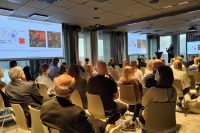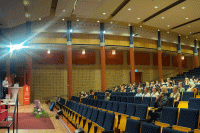DOCTORAL THESIS. Feeling unattractive and dissatisfied with their sexual ability – that is reality for many teenage and young adult cancer survivors. Research from Sahlgrenska Academy now gives a voice to a group that often has a difficult journey back to a normal life.
“People in healthcare are afraid to talk about this, but you have to dare and you have to be willing, without being brusque or overly upbeat,” says Maria Olsson, who holds a PhD in pediatrics from Sahlgrenska Academy and is a specialist nurse in cancerrehabilitation at Sahlgrenska University Hospital.
In her dissertation, she conducted eleven focus group interviews and a web-based survey involving 540 participants, all cancer survivors aged 15–29. The interviews clearly showed that teenagers and young adults would like to have age-appropriate treatment environments.

“If you’re 17 years old, it isn’t easy to be cared for among screaming toddlers. Meanwhile, a 25-year old may find himself in a four-bed hospital room with men in their 60s and 70s who are discussing the stock market. These patients rarely end up with someone from their own generation; they are usually scattered about,” says Maria Olsson.
Scars and attractiveness
The results from the questionnaire study showed that the young cancer survivors felt they were less attractive because of their physical scars compared with the control group. Appearance is important to many teenagers and young adults, and scars from cancer treatment should not be ignored, according to Maria Olsson.
Just over four out of ten teenage boys and young men, and close to eight out of ten teenage girls and young women who survived cancer replied that they felt less attractive because of their scars. They also expressed low satisfaction about their sexual ability compared with the control group, though the study showed that this response was more for psychological reasons than due to the physiological side effects of treatment.
“They feel dissatisfied with their sexuality, and they dislike their bodies and the scars that remind them of the disease and the difficulties they’ve experienced. That’s why they need more counseling and psychological support toward the end of treatment,” says Maria Olsson.
Open to discussing sex
At the beginning of the study, she and her colleagues encountered resistance to the possibility of asking questions about topics such as sexuality and suicidal thoughts. The funding sources, registry owners and ethics committees who were to approve the study considered the topics to be too sensitive.
However, the young people disagreed. The issue of fertility was the greatest concern among the nearly ten percent of participants who were worried about something in the questionnaire, followed by recurrence of cancer. However, discussing sex was no problem; on the contrary, there was a strong need to do so, according to Maria Olsson.
“You can’t do that in a four-bed hospital room, but there are many other opportunities. The topic can be addressed when the side effects of treatment come up for discussion, like how the mucous membranes are affected. By asking open questions first, it becomes evident whether the patient wants to talk, and that provides a lead to bring up the topic. It’s also important to show willingness to discuss the subject.”
Title: Adolescent and young adult cancer survivors – body image and sexual health; http://hdl.handle.net/2077/55381
TEXT: MARGARETA GUSTAFSSON KUBISTA










